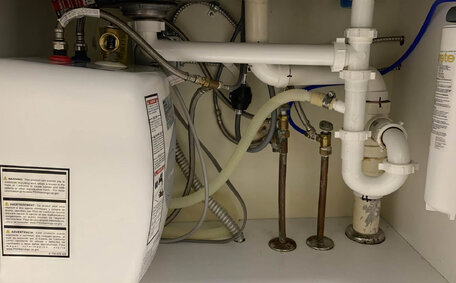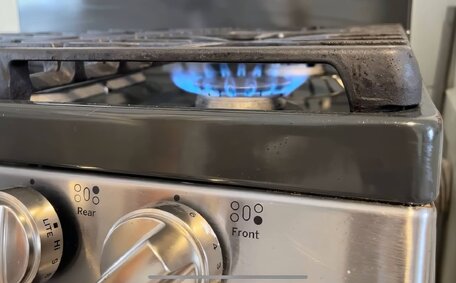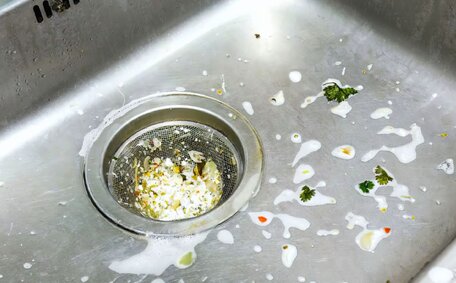Introduction to Gas Line Repairs
A leaking gas line in your Sydney home is a severe safety risk that demands prompt attention. As licensed gas fitters servicing Jamisontown and the wider Sydney region, Jamisontown Plumbing possesses the necessary skills to securely diagnose and fix leaks in your gas system.
This detailed guide equips homeowners with essential information for resolving gas line leaks effectively. We’ll guide you through leak identification, required tools, safety measures, recognising the need for professional assistance, and considerations for maintenance or replacement of old gas lines.
Adhering to these best practices in line with NSW standards prepares you for safely managing gas leaks to maintain the reliability of your home’s gas appliances.
Understanding Common Gas Line Issues
Some of the most common gas line problems stem from corrosion and damage. Galvanised steel pipes, prone to gas line leaks, typically last 15-20 years before they begin to corrode. Over time, unchecked corrosion can lead to a dangerous gas line leak.
Recognising these key indicators can alert you to the need for gas line repair:
- A strong 'rotten egg’ smell, which is added to natural gas as an odorant
- Visible corrosion or damage to pipes and fittings
- Flames appearing yellow or orange instead of blue
- Pilot lights that frequently blow out
- Increased moisture inside appliances after use
Alarming statistics indicate that up to 40% of Sydney homes with outdated galvanised steel gas pipes may harbour undetected gas line leaks. If your home exceeds 20 years of age, vigilance in monitoring for leaks and pursuing necessary repairs or upgrades is vital.
Diagnosing a Gas Line Problem
If you suspect an issue with your gas lines, there are a few key steps to diagnosing potential leaks or damage:
- Conduct a visual inspection of all exposed gas pipes and fittings. Look for any signs of corrosion, dents, cracks or damage. Check connections at appliances and ensure they are secure.
- Apply a soapy water solution to water heater joints and connections to reveal potential gas leaks. Apply it around joints, valves and fittings. If you see bubbles forming, this indicates a gas leak.
- Check inside gas appliances like your hot water system, cooktop or oven. Signs of a leak include soot buildup, abnormal moisture or pilot lights frequently blowing out.
- Check for the distinct 'rotten egg’ odour well away from main gas-using areas near appliances and pipes. If you detect this odour, it is critical to turn off the main gas valve without delay.
- Identify the potential source leak location for any gas escape. For larger leaks you may be able to hear a hissing sound. Use a combustible gas detector for smaller leaks.
- Evaluate the condition of older pipes. Galvanised steel pipes are prone to corrosion after 15-20 years. Arrange an upgrade if deterioration is visible.
Carefully following these diagnostic steps allows you to accurately pinpoint the location of any leaks and assess the overall safety of your gas lines.
Safety First: Preparing for a Gas Line Repair
When it comes to gas line repairs, safety should always be the top priority. There are critical safety preparations you must undertake before attempting any leak or damage repairs yourself:
- Find your home’s gas meter with the main valve and ensure you understand how to interrupt the service. This is typically found adjacent to your gas meter. Rotating this clockwise will eliminate any gas supply to the entire house.
- Open windows and evacuate all occupants, including pets, as gas leaks can displace oxygen, posing a risk of suffocation.
- Avoid turning on or off any electrical devices, and do not use phones or doorbells. Any spark could ignite leaking gas.
- If qualified, use an adjustable wrench to slightly loosen fittings or joints so gas can escape outside. Check these areas with a soapy solution to locate the leak.
- If leak location is uncertain and could take time to pinpoint, don’t take risks attempting repairs yourself. Call 000 for emergency assistance.
Taking the right precautions enables safe preparation of your home for gas line repairs. Remember to always exercise caution with potentially harmful gas leaks.
Shutting Off the Gas Supply
Once you’ve confirmed a gas leak in your home, immediately shut off the gas supply to ensure safety.
- Locate and turn off the gas valve next to the gas metre outside. Look for a handle or flathead that should be rotated clockwise to stop the gas flow.
- Use an adjustable wrench or appropriate sized spanner to turn the valve clockwise until gas flow is fully shut off.
- To verify gas supply is off, try turning on a cooktop burner. If it does not ignite, you have successfully shut off the supply.
- Leave the main valve in the off position until any repairs or replacements to your gas lines have been completed by a qualified technician.
- Once repairs are finished, open windows for ventilation. Slowly turn the main gas valve anti-clockwise while standing back to turn supply back on. Then check appliances to ensure all pilot lights and burners ignite correctly.
- If at any point you smell gas after attempting to restore supply, immediately re-shut the main valve and call 000.
By following these key steps, you can safely shut off gas to your home during repairs. But unless you are a qualified technician, never attempt to fix leaks yourself.
Ventilating the Area
After identifying and shutting off a gas leak, it’s crucial to ventilate the area properly before any repair attempts. LPG is heavier than air, meaning leaks can accumulate in enclosed spaces instead of dispersing.
Follow these vital steps to safely ventilate areas:
- Open all doors and windows in the affected rooms to allow fresh airflow.
- Employ large fans to expel any residual gas, rather than circulate it.
- Steer clear of activating any electrical devices that could generate sparks until full ventilation is achieved.
- Confirm there is no lingering gas smell or leaks with a combustible gas detector before re-entering previously evacuated areas.
- Maintain ventilation during the entire repair process in case of accidental leaks.
Ensuring proper ventilation removes any pooled gas and provides breathable oxygen levels. Never ignore or underestimate this step when dealing with potentially deadly gas leaks.
Gathering Tools and Materials
For DIY gas line repairs, you must have the appropriate tools and materials available. At a minimum, you’ll need:
- Adjustable wrench
- Pipe wrench
- Replacement pipes, fittings, seals – ensure any materials conform to Australian Standards
- Pipe joint compound/thread seal tape
- Soapy water solution and brush to check for leaks
- Combustible gas detector
- Safety gear: gloves, protective eyewear, ear plugs
While household tools may suffice for minor adjustments such as tightening fittings, considerable repairs require the skill of a professional gas fitter.
Use caution when selecting materials and tools for your DIY repair. Poor quality or improper items can worsen leaks. Consult Jamisontown Plumbing if unsure what’s required for your particular gas line issue.
Step-by-Step: How to Execute a Gas Line Repair
DIY gas line repairs carry risks if not executed correctly. If you have gas industry experience and are addressing a complex issue, here’s a safe, step-by-step guide:
- Ensure gas supply is shut off at the main valve and disconnect line from the appliance.
- Ventilate the area thoroughly before beginning work.
- Use pipe joint compound on threads before re-installing pipes or fittings.
- Verify seals are snug but not overtightened.
- Check all repaired joints and connections with soapy water, looking carefully for bubble formation.
- Restore gas supply once repairs are complete and check for leaks again.
- If any smell or issues arise, immediately re-shut off supply and call a professional.
While homeowners can tackle minor issues, qualified technicians should address significant leaks or perform full line replacements. Gas leaks pose extreme fire, health and explosion dangers so exercise caution.
Sydney homeowners seeking professional gas line repairs can rely on the expertise of Jamisontown Plumbing.
When to Call a Professional Gas Fitter
As a licenced gas fitter, the technicians at Jamisontown Plumbing have the expertise to handle gas line issues that pose dangers beyond regular DIY repairs.
You should call us immediately if you experience any of the following:
- An unknown source of leak you cannot locate
- Large volume leaks hissing loudly
- The main gas valve will not shut off the supply
- Significant corrosion, damage or deterioration of pipes
- Appliances, pilots or burners displaying abnormal flames
- Any exposure symptoms such as headaches, fatigue or breathing issues
Protect your home against future leaks by having your gas lines serviced and inspected annually.
Trust the licenced professionals at Jamisontown Plumbing for your next gas line repair. Call 1300 349 338 or email us to book your appointment.
Preventing Future Gas Line Problems
Preventing issues with your gas lines in the future involves establishing a proper maintenance routine. This will help maximise the longevity of your pipes, extend the lifecycle of appliances, and minimise the risk of dangerous leaks.
Below are some maintenance tips for your gas lines:
- Conduct an annual visual inspection of all visible gas pipes and fittings. Check for any signs of corrosion or damage. Address any concerning areas immediately.
- Have your gas appliances serviced yearly according to the manufacturer’s recommendations. This will optimise performance and safety.
- Consider upgrading old galvanised steel pipes. Copper or stainless steel pipes have an average 50 year lifecycle versus steel’s 15-20 years.
- Fit protective sleeving over exposed pipes to guard against unforeseen damage and subsequent leaks.
- Remove debris, vegetation, and soil accumulation around external vents, valves, and pipes to thwart corrosion.
- Fix dripping taps or pilot lights blowing out right away, even if they seem minor. Small problems can quickly escalate over time if left unchecked.
Establishing proactive maintenance allows you to stay ahead of any underlying issues and minimise the safety hazards from potential gas leaks or appliance failures down the track.
For professional support maintaining the gas lines in your Sydney home, the licenced technicians at Jamisontown Plumbing are ready to assist. Call us on 1300 349 338 to discuss your options.
Considering a Gas Line Replacement
There are several factors to weigh when considering upgrading or replacing your gas lines entirely:
- Age and Material - Galvanized steel pipes are prone to corrosion within 15-20 years. Opting for more durable materials like copper or stainless steel can mitigate future leaks.
- Recurring Issues - Frequent pilot light blowouts or lingering ‘rotten egg’ smells indicating underlying issues are signs a full replacement should be considered.
- Safety and Compliance - If your pipes are outdated or deteriorating, replacement ensures optimal safety and compliance with current standards.
- Improved Efficiency - New gas line materials and appliance fittings can increase fuel efficiency, lower your bills, and reduce greenhouse emissions.
- Property Value - Enhanced gas infrastructure can increase property value. Contemporary lines suggest diligent maintenance to potential buyers.
The licensed technicians at Jamisontown Plumbing offer quotes for comprehensive evaluations and replacements of your home’s gas lines. New, enduring piping upgrades enhance safety, efficiency and add value to your home.
For professional assistance determining if your Sydney home would benefit from new gas lines, contact the experts at Jamisontown Plumbing on 1300 349 338.
Responding to a Gas Leak Emergency
Detecting a 'rotten egg’ odour or hearing hissing that suggests a gas leak demands instantaneous action. Open all doors and windows to ventilate, while ensuring ventilation fans and other ignition sources stay off.
Clear the residence and gather at a safe distance from your property. Check surrounding properties for signs of migrated gas. Immediately call 000 for emergency assistance to address and secure the leak.
As licenced emergency plumbers operating locally in Jamisontown, we are equipped for rapid response to gas leak calls 24/7. For emergency gas leak response in the Jamisontown region, call our priority hotline on 1300 349 338.
Our technicians carry gas analysers to locate leaks, valves and tools to safely seal breaches, and compliance know-how to get your property reconnected once the hazard is cleared.






